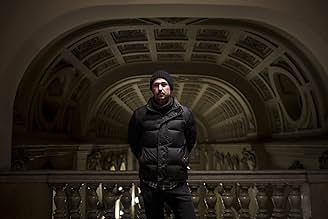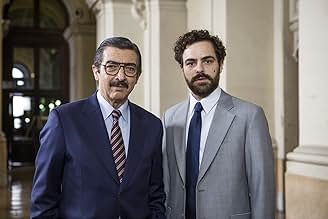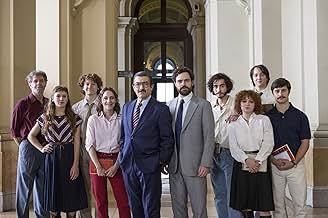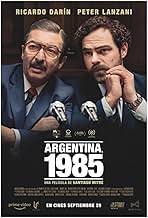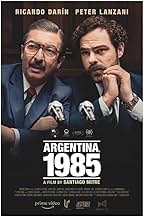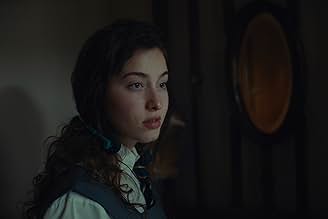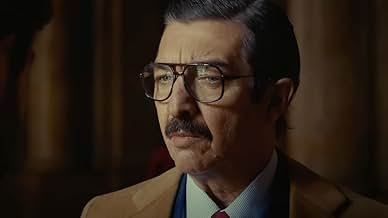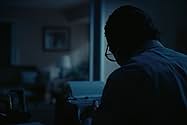A team of lawyers takes on the heads of Argentina's bloody military dictatorship during the 1980s in a battle against odds and a race against time.A team of lawyers takes on the heads of Argentina's bloody military dictatorship during the 1980s in a battle against odds and a race against time.A team of lawyers takes on the heads of Argentina's bloody military dictatorship during the 1980s in a battle against odds and a race against time.
- Director
- Writers
- Stars
- Nominated for 1 Oscar
- 49 wins & 45 nominations total
Gabriel Martín Fernández
- Bruzzo
- (as Gabriel Fernández)
- Director
- Writers
- All cast & crew
- Production, box office & more at IMDbPro
Summary
Reviewers say 'Argentina, 1985' is a powerful film exploring Argentina's military dictatorship trial. It is lauded for strong performances, especially Ricardo Darín, and its emotional engagement. Critics appreciate the balance of tension, humor, and historical accuracy, though some find lacking depth in character development and context. The cinematography and direction effectively capture the era's atmosphere. Despite minor critiques on pacing and bias, it is seen as an important, impactful work resonating with audiences familiar with Argentina's history.
Featured reviews
Argentina, 1985 is inspired by the true story of the prosecutors Julio Strassera and Luis Moreno Ocampo, who in 1985 dared to investigate and prosecute those responsible for the bloodiest phase of the Argentine military dictatorship, which fell only 2 years earlier. Without being intimidated by the regime, the expert Strassera and the young Moreno Ocampo formed a young legal team of unlikely heroes to wage an unequal battle.
Constantly threatened, together with their families, they fought against time to give justice to the victims of the military junta which in 1976 deposed Isabelita Martinez De Peron in a coup. The members of the junta were tried for crimes committed by the Armed Forces in those years, which resulted in over 30,000 disappeared in December 1985, many were sentenced to life imprisonment. The film has the advantage of effectively reconstructing, in the same places where the facts took place, the difficult investigative work and the four-month trial with 833 eyewitnesses and survivors of clandestine detention and torture centers.
Also using a surprisingly humorous tone, which makes the magistrate (played by an extraordinary Ricardo Darìn) more human, likeable his very young group of lawyers and affectionate his beautiful family reveals the private side of an honest man. The 1985 trial allowed the Argentine justice to recognize and reclaim a long denied right. It inaugurates democracy and condemns the use of violence as a possibility.
When state terrorism takes hold in society, there is always an attempt to annihilate citizens and eliminate the possibility of communication.
Constantly threatened, together with their families, they fought against time to give justice to the victims of the military junta which in 1976 deposed Isabelita Martinez De Peron in a coup. The members of the junta were tried for crimes committed by the Armed Forces in those years, which resulted in over 30,000 disappeared in December 1985, many were sentenced to life imprisonment. The film has the advantage of effectively reconstructing, in the same places where the facts took place, the difficult investigative work and the four-month trial with 833 eyewitnesses and survivors of clandestine detention and torture centers.
Also using a surprisingly humorous tone, which makes the magistrate (played by an extraordinary Ricardo Darìn) more human, likeable his very young group of lawyers and affectionate his beautiful family reveals the private side of an honest man. The 1985 trial allowed the Argentine justice to recognize and reclaim a long denied right. It inaugurates democracy and condemns the use of violence as a possibility.
When state terrorism takes hold in society, there is always an attempt to annihilate citizens and eliminate the possibility of communication.
Great true story that highlights why it's so important to have independent courts, that can't be bullied or harassed by anti democratic forces like the military in Argentina.
This movie should be shown in every classroom in all democratic countries. To vaccinate against anti democratic behavior!
A must see for all democratic and peace loving people, wherever they live.
It will also give hope for them who currently live in a evil country with dictatorship.
One day justice will be served and the good ones will win. It's only a matter of time, and the courage of good men and women who believes in justice!
This movie should be shown in every classroom in all democratic countries. To vaccinate against anti democratic behavior!
A must see for all democratic and peace loving people, wherever they live.
It will also give hope for them who currently live in a evil country with dictatorship.
One day justice will be served and the good ones will win. It's only a matter of time, and the courage of good men and women who believes in justice!
The movie starts pretty slow, but from the beginning on you can connect with the characters. The first half hour or so has A LOT of funny little moments, maybe even one or two to many, considering the tone and themes of the movie, but it still works somehow, especially because the actors do a very good job(Important sidenote: I watched it in the original language with subtitles).
The movie lacks a bit of structure though, and the first half feels a bit long and stretched in some parts, it doesn't really feel like we are getting somewhere anytime soon. But it picks up in the second half! What still lacks is real tension. BUT there are a lot of very powerful moments near the end, spectacularly delivered by the cast.
You should also not expect thorough explanations of argentinian history or the court case itself, the movie is about people fighting for justice and shows there struggles and emotions.
So if you want to see an emotional, yet funny, movie with some real heart, and you bring some patience with you, I can really recommend it!
The movie lacks a bit of structure though, and the first half feels a bit long and stretched in some parts, it doesn't really feel like we are getting somewhere anytime soon. But it picks up in the second half! What still lacks is real tension. BUT there are a lot of very powerful moments near the end, spectacularly delivered by the cast.
You should also not expect thorough explanations of argentinian history or the court case itself, the movie is about people fighting for justice and shows there struggles and emotions.
So if you want to see an emotional, yet funny, movie with some real heart, and you bring some patience with you, I can really recommend it!
Argentina undergoes the biggest civilian trial in its history by putting in the dock the military officers who ruled the country for years, who, in their effort to subdue the guerrillas, orchestrated one of the harshest genocides in recent history: kidnappings, tortures and murders that were to go unpunished.
Because of its political plot, the film will generate different results in the viewer, mainly among Argentines. One character is saved, Attorney General Stassera, showing an integrity that is a great inspiration. However, for those who know the details of the real story and even more for those who have lived through it, these stories with a clear political hero always leave someone with a bad taste in their mouth.
On the other hand, considering that this is a trial that many viewers may not be aware of, the film's plot is well-developed if somewhat lengthy.
The drama is both entertaining and tough, as is so often the case with Argentine films starring Darín.
The camera play is good, to the point that it is difficult to distinguish the historical shots from the fictional ones. The characters are very well chosen.
Undoubtedly, Darín's performance, once again, is among the best in this feature film. He supports the rest of the actors - the family scenes are practically his - leads them as he wants and always leaves that humorous tone of fine irony in all his gestures.
A remarkable film that can be recommended to a minimally serious audience.
Because of its political plot, the film will generate different results in the viewer, mainly among Argentines. One character is saved, Attorney General Stassera, showing an integrity that is a great inspiration. However, for those who know the details of the real story and even more for those who have lived through it, these stories with a clear political hero always leave someone with a bad taste in their mouth.
On the other hand, considering that this is a trial that many viewers may not be aware of, the film's plot is well-developed if somewhat lengthy.
The drama is both entertaining and tough, as is so often the case with Argentine films starring Darín.
The camera play is good, to the point that it is difficult to distinguish the historical shots from the fictional ones. The characters are very well chosen.
Undoubtedly, Darín's performance, once again, is among the best in this feature film. He supports the rest of the actors - the family scenes are practically his - leads them as he wants and always leaves that humorous tone of fine irony in all his gestures.
A remarkable film that can be recommended to a minimally serious audience.
It's not easy to talk about one of the darkest periods in Argentina's history - including torture, rapes and deaths - and to do it in an appealing way that doesn't become too heavy or exploit the victims' suffering in an abusive way. It's not easy, but they did it.
The script by Llinás and Miter is quite refined, careful and intelligent in the way it addresses all the atrocities of the regime, always saying what it has to say, but it is also intelligent in the way it incorporates moments of humour, a personal and familiar dimension that helps us to identify with the characters, being able to transform everything that happened in one of the most important judgments in history into hope and a turning point. I'm not Argentine. I'm not an easy tear person. However, it is difficult to contain emotions in certain depositions or when in his closing arguments, prosecutor Straessera says "Nunca más" (Never Again). People who have lived under dictatorial regimes or who have heard the stories told by their parents or grandparents cannot remain indifferent to such a moment.
Santiago Miter's direction is super smart too. It's filmed soberly when necessary. It's filmed using movement and different techniques when the action requires it, such as in moments of greater tension, such as during a harrowing dinner with the Assistant Attorney, Luis Moreno Ocampo. The editing is also very efficient, helping a 140-minute film on such a heavy topic - and with much of its time spent in an investigation or in court - pass quickly, using several scenes on the screen at the same time, resorting to overlapping voices and testimonies, resorting to music whenever the film has something to extract from it, not seeming to do anything by chance.
Finally, it is impossible not to mention the excellent actors who make this film. All the supporting actors are at a good level, but the dynamic between Ricardo Darin (as the Attorney General) and Peter Lanzani (as the Assistant Attorney) is one of the highlights, always seeming true and honest, being easy to sympathize and cheer for those characters. Darin could very well have taken a more showy approach, but it is his sobriety and distinct personality that are his greatest strengths.
A must-see film for anyone who cares about the human condition and dignity. A film that recalls that certain pages of history must never be lived again. Nunca más!
The script by Llinás and Miter is quite refined, careful and intelligent in the way it addresses all the atrocities of the regime, always saying what it has to say, but it is also intelligent in the way it incorporates moments of humour, a personal and familiar dimension that helps us to identify with the characters, being able to transform everything that happened in one of the most important judgments in history into hope and a turning point. I'm not Argentine. I'm not an easy tear person. However, it is difficult to contain emotions in certain depositions or when in his closing arguments, prosecutor Straessera says "Nunca más" (Never Again). People who have lived under dictatorial regimes or who have heard the stories told by their parents or grandparents cannot remain indifferent to such a moment.
Santiago Miter's direction is super smart too. It's filmed soberly when necessary. It's filmed using movement and different techniques when the action requires it, such as in moments of greater tension, such as during a harrowing dinner with the Assistant Attorney, Luis Moreno Ocampo. The editing is also very efficient, helping a 140-minute film on such a heavy topic - and with much of its time spent in an investigation or in court - pass quickly, using several scenes on the screen at the same time, resorting to overlapping voices and testimonies, resorting to music whenever the film has something to extract from it, not seeming to do anything by chance.
Finally, it is impossible not to mention the excellent actors who make this film. All the supporting actors are at a good level, but the dynamic between Ricardo Darin (as the Attorney General) and Peter Lanzani (as the Assistant Attorney) is one of the highlights, always seeming true and honest, being easy to sympathize and cheer for those characters. Darin could very well have taken a more showy approach, but it is his sobriety and distinct personality that are his greatest strengths.
A must-see film for anyone who cares about the human condition and dignity. A film that recalls that certain pages of history must never be lived again. Nunca más!
Did you know
- TriviaAfter winning the Golden Globe for best non-English language film, fellow actor Peter Lanzani revealed that Ricardo Darín used his "lucky charm" for awards ceremonies and told the cast and crew to think, "Don't worry, we're not going to win, we have no chance, we're losers, be calm, we won't have to make a speech, we won't win."
- Goofs(at around 43 mins) The taxis of the time had a logo in the shape of a circle with an identification number on the front door. In this scene the taxis don't have any logo except the taxi sign on the roof.
- Quotes
Julio César Strassera: History was not made by guys like me.
- Crazy creditsPhotographs from the trial are shown in the credits.
- ConnectionsFeatured in Javo & Temoc: Top 10 Películas: Lo "mejor" del año (2022)
- SoundtracksSalir de la melancolía
Written by Charly García (as Carlos Alberto 'Charly' García)
Performed by Serú Girán
- How long is Argentina, 1985?Powered by Alexa
Details
- Release date
- Countries of origin
- Languages
- Also known as
- Аргентина, 1985
- Filming locations
- Production companies
- See more company credits at IMDbPro
Box office
- Gross worldwide
- $905,893
- Runtime2 hours 20 minutes
- Color
- Aspect ratio
- 1.50 : 1
Contribute to this page
Suggest an edit or add missing content







